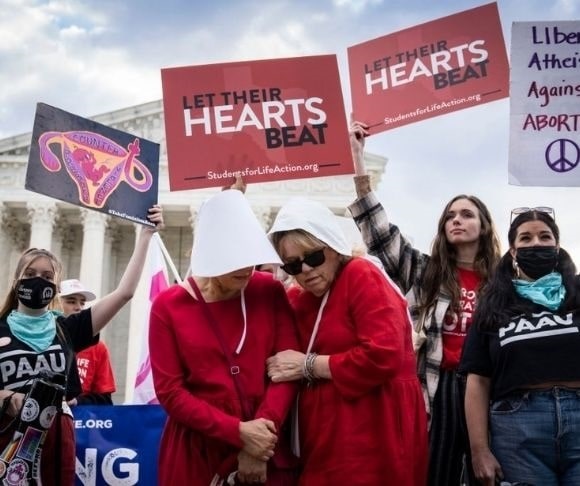Today (Dec. 1) the Supreme Court will hear Dobbs v Jackson Women’s Health Organization. Quite simply, it’s the biggest abortion case in a generation that could impact Roe v Wade. While it is not likely that the justices will overturn Roe, it is more likely with this case than any other in the 48 years since Roe was decided.
Undue Interference
 Abortion cases often come to the Supreme Court because a state has enacted a certain barrier to abortions, such as a requirement that they be performed at a certain type of facility or after a waiting period. That specific barrier is then legally challenged and works its way up to the Supreme Court. This is not the case with Dobbs v Jackson Women’s Health. Mississippi passed a law banning abortion after the 15th week of pregnancy, a broad prohibition presenting a fundamental challenge to current abortion precedent.
Abortion cases often come to the Supreme Court because a state has enacted a certain barrier to abortions, such as a requirement that they be performed at a certain type of facility or after a waiting period. That specific barrier is then legally challenged and works its way up to the Supreme Court. This is not the case with Dobbs v Jackson Women’s Health. Mississippi passed a law banning abortion after the 15th week of pregnancy, a broad prohibition presenting a fundamental challenge to current abortion precedent.
The two most significant abortion cases on the books are Roe v Wade and Planned Parenthood v Casey. In 1973, Roe ensured a woman’s right to abort her pregnancy and said laws criminalizing all abortions violate the Due Process Clause of the Fourteenth Amendment. The Court divided pregnancy into trimesters, ruling that regulations would be forbidden in the first, but allowing each subsequent trimester to gain heavier state intervention. In 1992, Casey established, among other things, that women have the right to abort pre-viability (about 24 weeks) without undue interference from the state.
The Question Presented
“Undue interference” then became the impediment few abortion restrictions could surmount. The Supreme Court rarely accepts a case to re-evaluate a precedent it has set explicitly. While precedents do change, that often happens when the Court examines a tangential issue or split in the circuits, rather than via a direct challenge, which is what this case represents. The Supreme Court accepted it to issue a new answer to the following question:
“Whether all pre-viability prohibitions on elective abortions are unconstitutional.”

(Photo by Drew Angerer/Getty Images)
Mississippi’s brief asks the Court to scrap Roe and Casey and come up with something new, leaving it to the states to decide abortion law, saying, “the Constitution leaves most issues to the people—and that abortion is such an issue.” The state added, “Retaining those precedents [Roe & Casey] harms this Court’s legitimacy.” Jackson Women’s Health Organization, the only licensed abortion provider in Mississippi, thought the Court was wrong to accept the case at all, writing, “The decision below properly applies this Court’s precedent and does not conflict with the decision of any other court. Nothing about this case warrants this Court’s intervention.” Perhaps the justices will agree that they shouldn’t touch the Court’s precedents and will leave Casey and Roe alone. If so, then why take the case?
Changes in the Offing
Simply by accepting the case for a hearing, the Court indicates that at least four justices, the minimum required, want to revisit these landmark cases. This is the closest the Court has ever come to addressing the country’s fundamental abortion laws. On Nov. 29, Senator Jeanne Shaheen (D-NH) promised “a revolution” if the Court changed the law. She said:
“I hope the Supreme Court is listening to the people of the United States because – I think if you want to see a revolution go ahead, outlaw Roe v. Wade and see what the response is of the public, particularly young people, because I think that will not be acceptable to young women or young men.”
The Court may choose to keep the current rules intact, give power to the states to regulate abortion, or even outlaw all abortions as impermissible impositions on the unborn fetus’ rights. Oral arguments have been scheduled for longer than usual. Scott G. Stewart, the solicitor general of Mississippi, will have 35 minutes to represent the state. Julie Rikelman, litigation director of the Center for Reproductive Rights, will then argue for 20 minutes on behalf of Jackson Women’s Health Organization. Finally, the U.S. Solicitor General Elizabeth B. Prelogar will have 15 minutes to support Jackson Women’s Health Organization. In most Supreme Court cases, the executive branch can make arguments through the solicitor general’s office as the president directs.
The Supreme Court is expected to decide the case before the summer 2022 break.
~ Read more from Scott D. Cosenza.




